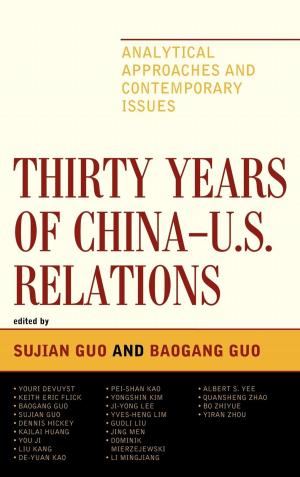Human Rights in Nigeria's External Relations
Building the Record of a Moral Superpower
Nonfiction, Reference & Language, Law, International, Social & Cultural Studies, Political Science| Author: | Philip Aka | ISBN: | 9781498533560 |
| Publisher: | Lexington Books | Publication: | December 20, 2016 |
| Imprint: | Lexington Books | Language: | English |
| Author: | Philip Aka |
| ISBN: | 9781498533560 |
| Publisher: | Lexington Books |
| Publication: | December 20, 2016 |
| Imprint: | Lexington Books |
| Language: | English |
This book is a broad-ranging argument for thorough reforms at home and abroad in Nigeria as the only antidote to the nation-building dilemmas Nigeria confronts in the first quarter of the twenty-first century. Because of its enormous material and human endowments, Nigeria is dubbed the “Giant of Africa.” It is a moniker many of its leaders take seriously. Yet, Nigeria is a state rife with instability, some of it periodically erupting into violence. Given still-ongoing national security challenges in the land that notoriously includes a bloody religion-oriented terrorism, the Fourth Republic since 1999, the longest period of continuous democratic rule since independence—key to the timeline of this book—has not been insulated from the spell of instability.
The main argument of this work is that internationally agreed-upon ethical standards embedded in human rights can save Nigeria. This book is a methodologically and theoretically-grounded, seminal discourse on Nigerian foreign relations that spells out the human rights or lack thereof in those relations, including underlying and impinging domestic forces.
This work is set around six issues of application embedded in a temple of Nigeria’s human rights foreign policy, comprising two steps and four pillars: reconstructed national interest, increased human rights at home, redesigned peacekeeping, reshaped foreign policy machinery, increased bilateralism in foreign relations, and the use of ECOWAS as human rights tool. Although focused on the period since independence, for proper understanding of events from the past that shape the current patterns of politics in the land, this book also embodies a historical background chapter that overviews the pre-colonial and colonial eras.
This book is a broad-ranging argument for thorough reforms at home and abroad in Nigeria as the only antidote to the nation-building dilemmas Nigeria confronts in the first quarter of the twenty-first century. Because of its enormous material and human endowments, Nigeria is dubbed the “Giant of Africa.” It is a moniker many of its leaders take seriously. Yet, Nigeria is a state rife with instability, some of it periodically erupting into violence. Given still-ongoing national security challenges in the land that notoriously includes a bloody religion-oriented terrorism, the Fourth Republic since 1999, the longest period of continuous democratic rule since independence—key to the timeline of this book—has not been insulated from the spell of instability.
The main argument of this work is that internationally agreed-upon ethical standards embedded in human rights can save Nigeria. This book is a methodologically and theoretically-grounded, seminal discourse on Nigerian foreign relations that spells out the human rights or lack thereof in those relations, including underlying and impinging domestic forces.
This work is set around six issues of application embedded in a temple of Nigeria’s human rights foreign policy, comprising two steps and four pillars: reconstructed national interest, increased human rights at home, redesigned peacekeeping, reshaped foreign policy machinery, increased bilateralism in foreign relations, and the use of ECOWAS as human rights tool. Although focused on the period since independence, for proper understanding of events from the past that shape the current patterns of politics in the land, this book also embodies a historical background chapter that overviews the pre-colonial and colonial eras.















